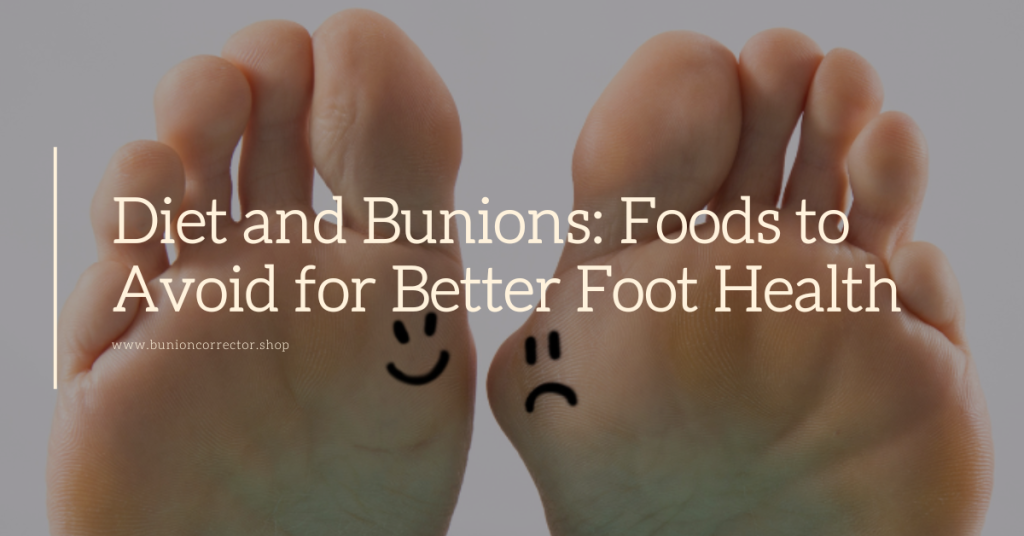When you think about foot health, diet might not be the first thing that comes to mind. However, what you eat can significantly impact your body, including your feet. Diet and Bunions: For those who suffer from bunions, diet plays a vital role in managing symptoms, reducing inflammation, and preventing further complications. In this blog post, we’ll explore how certain foods can aggravate bunions and discuss what you should avoid to keep your feet as healthy and pain-free as possible.

What Are Bunions?
Diet and Bunions: Understanding the Condition
A bunion is a bony bump that forms on the joint at the base of your big toe. It occurs when the bones in the front part of your foot shift out of place, causing the big toe to lean toward the second toe. Over time, the joint becomes more prominent and can cause pain, discomfort, and difficulty walking.
While genetics, improper footwear, and standing for long periods can contribute to bunions, inflammation and stress on the foot’s joints also play a role. That’s where your diet comes in. Certain foods can trigger or worsen inflammation, making bunions more painful. Understanding which foods to avoid can help you manage your condition more effectively.
How Does Diet Affect Bunions?
The Role of Inflammation
Diet and Bunions: One of the critical factors in bunion pain is inflammation. When your body experiences inflammation, it reacts by swelling, which can cause increased pain around your bunion. Some foods cause or worsen inflammation, particularly in the joints, including those in your feet.
In addition, a poor diet can lead to weight gain, which puts extra pressure on your feet, exacerbating bunion pain. Keeping your weight in check through a balanced diet can reduce stress on your feet and lower the chances of your bunion worsening.
Foods to Avoid for Better Foot Health
- Refined Carbohydrates and Sugars
Refined carbohydrates and sugars are common culprits when it comes to inflammation. Foods like white bread, pasta, pastries, and sugary snacks spike blood sugar levels, which triggers the body’s inflammatory response. Diet and Bunions: This inflammation can aggravate the joints in your feet, including the ones affected by your bunion.
Instead of refined carbs, try incorporating whole grains like brown rice, quinoa, and oats into your diet. These alternatives provide more nutrients and are less likely to cause inflammation.
- Fried and Processed Foods
Fried foods and heavily processed snacks, such as chips, fried chicken, and fast food, are packed with unhealthy fats, contributing to inflammation. These foods also tend to be high in calories, which can lead to weight gain and put more pressure on your feet, worsening bunion pain.
Opt for foods that are grilled, baked, or steamed. Not only will this reduce the intake of inflammatory fats, but it will also help you maintain a healthier weight, further reducing strain on your feet.
- Red and Processed Meats
Red meats, such as beef and pork, and processed meats, like bacon, sausages, and deli meats, are high in saturated fats and certain compounds that can trigger inflammation. Inflammation caused by these meats can directly impact the joints, worsening bunion discomfort.
Try replacing red and processed meats with lean protein sources like chicken, turkey, fish, or plant-based proteins such as beans and lentils. These alternatives are lower in fat and less likely to cause inflammation.
- Dairy Products
While dairy doesn’t affect everyone the same way, for some people, it can trigger inflammation in the body. Milk, cheese, butter, and other dairy products contain a protein called casein, which can lead to inflammatory responses in sensitive people. Diet and Bunions: This can make bunions more painful and uncomfortable.
If dairy worsens your bunion symptoms, consider switching to non-dairy alternatives like almond milk, coconut yogurt, or plant-based cheese options.
- Alcohol
Excessive alcohol consumption can lead to increased inflammation in the body, particularly in the joints. This can intensify the pain associated with bunions and hinder your body’s ability to heal from the stress your feet endure. Additionally, alcohol is high in calories, which can lead to weight gain and further strain on your feet.
Limit your alcohol intake, or avoid it altogether if possible. Instead, hydrate your body with water, herbal teas, and other non-inflammatory beverages.
- High-Sodium Foods
A diet high in sodium (salt) can cause your body to retain water, which leads to swelling and can put additional pressure on your bunion. Diet and Bunions: Processed foods, canned soups, salty snacks, and restaurant meals are often loaded with sodium, contributing to this problem.

Try cooking more meals at home using fresh ingredients to reduce sodium intake. Season your food with herbs and spices rather than salt to help minimize inflammation and prevent swelling.
Diet and Bunions: Foods That Promote Foot Health
Now that you know what to avoid, it’s essential to highlight the foods that can help reduce inflammation and promote better foot health. Incorporating these into your diet can make a big difference in managing bunion pain:
- Omega-3 Fatty Acids
Omega-3s are anti-inflammatory fats in foods like fatty fish (salmon, mackerel, sardines), flaxseeds, chia seeds, and walnuts. These fats help reduce inflammation throughout the body, including in the joints and can help alleviate bunion discomfort.
- Antioxidant-Rich Fruits and Vegetables
Fruits and vegetables rich in antioxidants help combat inflammation and support joint health. Look for brightly coloured produce like berries, leafy greens, tomatoes, and bell peppers packed with vitamins and minerals that promote overall well-being.
- Whole Grains
Whole grains, such as brown rice, quinoa, and oats, are less processed than refined grains and contain more fibre, which helps stabilize blood sugar and reduce inflammation. Swapping out refined grains for whole grains can help you maintain a healthier diet and manage bunion symptoms more effectively.
- Turmeric and Ginger
Both turmeric and ginger are natural anti-inflammatory foods. Turmeric contains a compound called curcumin, known for its powerful anti-inflammatory properties. Incorporating these spices into your meals, either in fresh or powdered form, can help reduce bunion pain.
Conclusion
While bunions can be painful and frustrating, managing your diet can help ease the discomfort. Diet and Bunions: By avoiding foods that trigger inflammation—such as refined carbohydrates, fried foods, red meats, dairy, alcohol, and high-sodium items—you can reduce the stress on your feet and promote better foot health overall. Instead, focus on anti-inflammatory foods like omega-3 fatty acids, antioxidant-rich fruits and vegetables, and whole grains.